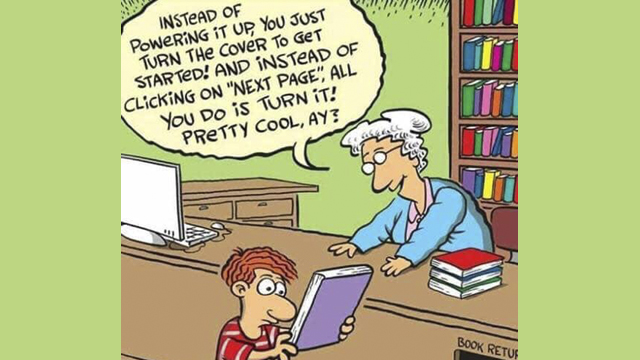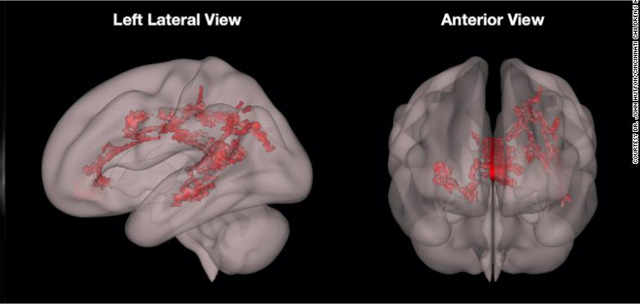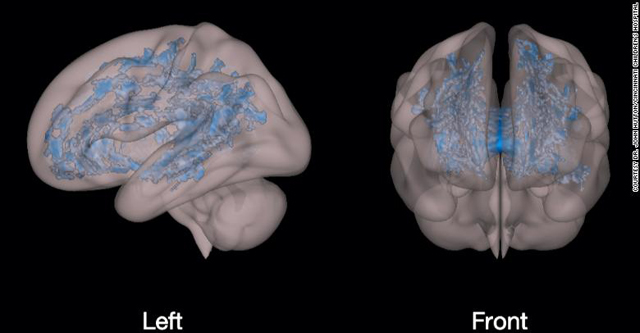Digital Screen use Reduces Brain Development
Reading Books vs Scrolling Screens
Recent research study now confirms that digital screen use for children (birth to 5) drastically reduces brain development.
On the other hand, study after study shows that reading aloud to children actually boosts brain development.
Books vs. Screens: Brain Scan Images
Concerning the formative years of birth to age 5, we can now compare two contrasting activities: reading aloud to your children – or allowing digital screen use. It does make a difference.
BRAIN on READING BOOKS
This is the brain scan of a preschooler who has been consistently read to by the parent. The red areas show an increase:
- in well-ordered white matter in the language and literacy areas
- these are areas that support the stages of learning in the school experience.
BRAIN on DIGITAL SCREEN
- The blue in this brain scan image is of a pre-schooler who spends an average of two hours a day playing on screens. The image shows:
- massive underdevelopment and disorganization of white matter in the language and literacy areas
Both images are from recent studies done by the Reading & Literacy Discovery Center of Cincinnati’s Children’s Hospital.
Amazing Benefits for Books vs Screen Usage in Brain Development
The brain develops fastest in the first five years of life. Children who have a stimulating environment of play, dialogue with grown-ups, being held, going outside, and especially receiving routine read-aloud time (see last week’s blog), show that their brains are able to fluidly organize their experiences and knowledge. These children have an enormous advantage when they reach Kindergarten, often outpacing their peers by 12 months development.
But children who use screen time only one hour per day are not only behind, but they have a significant challenge to catch up.
Books vs Screens Affect White Matter in the Brain
The brain scans in these studies examined the white matter of physically healthy children between the ages of three and five before they began kindergarten.
What is White Matter?
Most people know that the brain is made up of gray matter that contains the mass of brain cells that tell the body what to do. White matter is in there, also, consisting of fibrous bundles called ‘tracts’. These are the connectors between brain cells and the rest of the nervous system.
Job of White Matter
White matter is supremely important for the brain’s communication skills, which allow the brain to keep learning from every new experience. If the white matter is not developed, or is poorly organized, the speed of the brain connections is significantly slower, and thus learning is slow. This is what happens in the brain of the pre-schooler who uses one hour of digital screen time per day.
Amazing Importance of Neurons in Children’s Brains
Babies are born with more neurons than adults, and every new experience grows more heurons. Each experience reinforces the neurons connections. As the child grows, the neurons they use the most become hardwired, and become the instant habit energy that allows stability in their young life.
Consequences
The amazing fact is that the body-brain prunes away all the neurons that are not hardwired. Gone.
Thus, if children use a digital screen device for even one hour per day, then they do not use precious neurons that stimulate growth in the brain – and eventually the brain-body prunes them away.
That explains why the digital screen child cannot catch up to the child who has been read to.
Note:
The brain can change and learn at all ages, but it is faster and more efficient for pre-age five. This is comparable to the question often asked about pets: would you rather train a puppy or a full grown dog? In both circumstances, we see the importance of effective early learning experiences for the young.
Cognitive Tests for Book readers vs. Screen Users
This research study further tested the brain development of the children with cognitive testing. The results were much the same as the brain scans:
- those consistently read aloud to scored higher on all the cognitive tests.
- but screen time children had poorer literacy skills, expressive language, and could not quickly name objects. Also problematic was that they did not use their imagination, especially with play-time and outdoor activities that further develop the brain.
Next Week:
It’s clear that reading to your children can help ensure fluid development of their brains. My next blog will further assess the wonderful benefits of reading aloud to your children and what parents can do to make it all happen… with your…
LIGHT ON!








